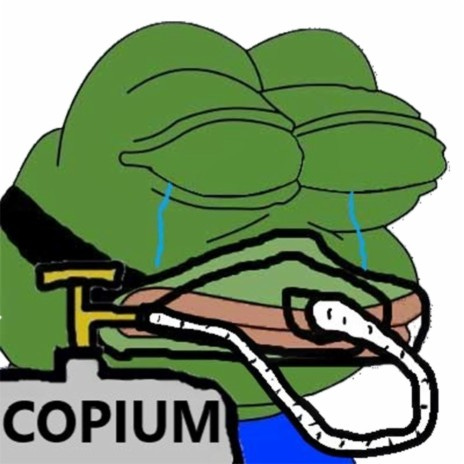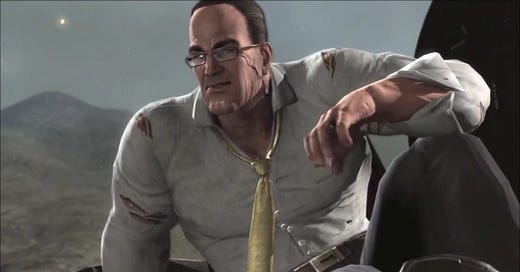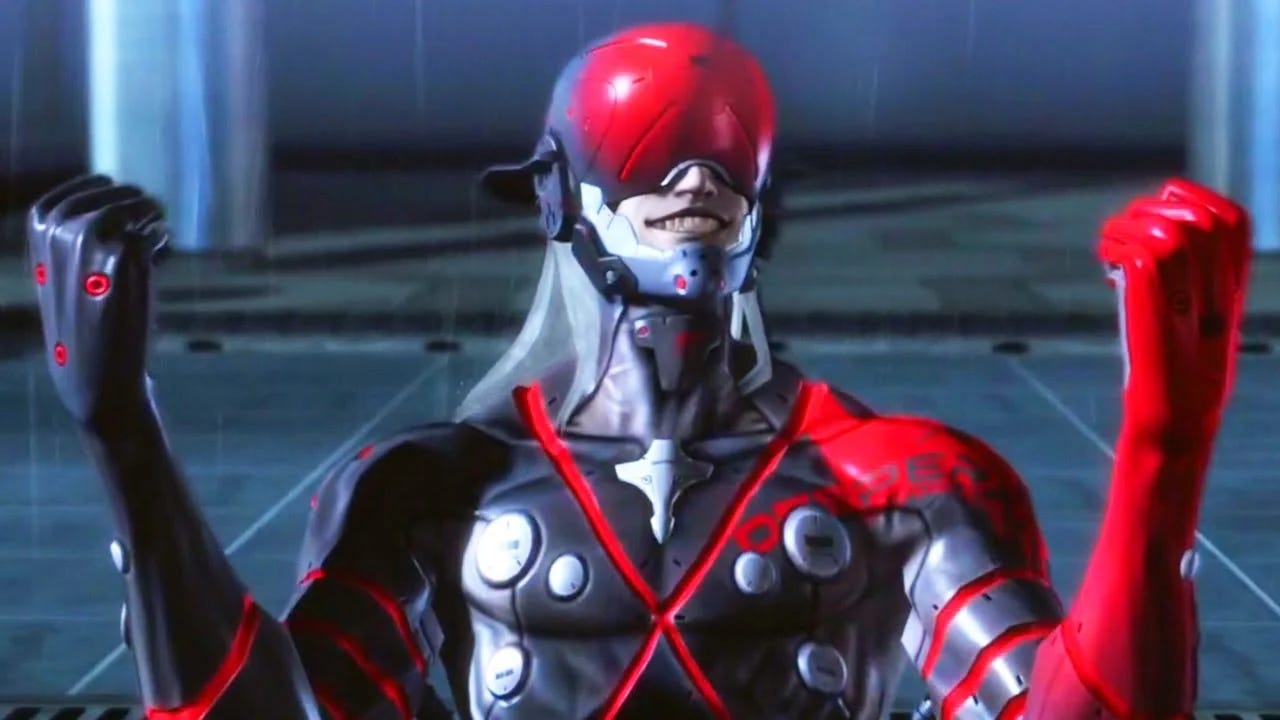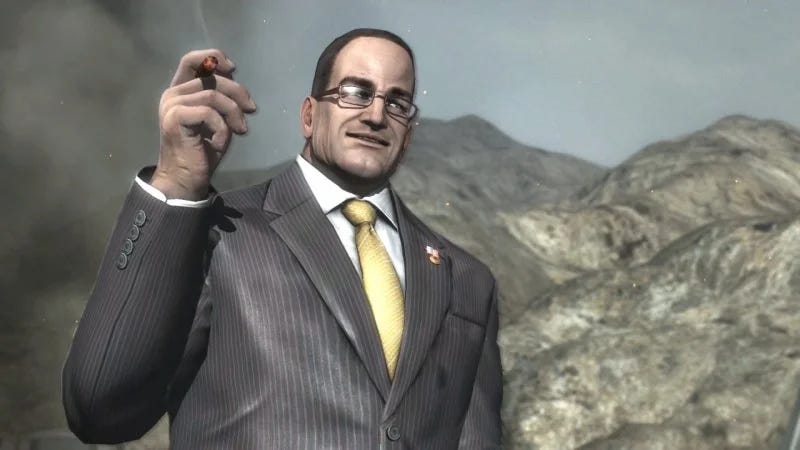How Metal Gear Rising's depiction of decentralised power versed a generation in shorthand political dialogue
Or, how a cyborg ninja's processor grew two sizes.
Hideo Kojima is known as the Bard of Biomechanics: a bewitching auteur with a particular fascination on the human body’s relationship with both metal and its subsequent gears of power. His preternatural understanding of one’s relationship between passive and active media revolutionised virtual narratives; salient allegories are rendered in the form of military opera - mechs as instruments of mourning. We are enlisted to commandeer one hero’s plight against a clandestine network of private corporations, whose agenda is driven by a ravenous profit motive, rather than honour, nor a desire to resolve familial threads. Imagine, if you dare, a rendition of the United States controlled by vested, insidious interests, with elections rendered acts of puppetry from foreign actors - difficult as it may be.
Regardless, the precise pulpiness of Kojima’s sprawling series, in its own idiosyncratic respect, made for a multimedia canon in the earliest days of the internet. In its time, a ‘meme’ has emerged from an amusing image macro to a weapon of social mobilisation. Works of academia on the matter emerged in the years following the 2016 U.S. presidential election, charting a collective desire to reduce complex figures into recognisable emblems of shared significance. Consequently, an innocuous character in Pepe the Frog became a flashpoint of semantic struggle against his association with extremist ideology. Those of this particular persuasion perceived the Trump campaign’s success as an appendage of their movement, rather than the inverse: their organisation would bleed into the mainstream. Conversely, reclamation of ‘Dark Brandon’ on the Democrat’s behalf served as a novel gesture, rather than a natural part of their process: a refutation, not an endorsement.
Donald Trump’s metamorphosis from the 45th to the 47th President of the United States is a regrettable regression. The familiar chords of 2016 reverberated to eerie effect, reassembling the monster of old through a Frankensteined cabinet of unscrupulous technocrats, turncoats and hypocrites. This time, Trump’s ideologues did not code their rhetoric, rather presenting it in frank, forthright terms; Project 2025 actively called for the country to return to a manner of nuclear brinksmanship. Indeed, this flirtation with armageddon is a risible echo of the 80’s action programmers Kojima predicated his work upon: a time where policy was drawn upon the presumption of mutually-assured destruction. Therefore, the exaggerated ethic of the Metal Gear canon may be an effective cipher to discern how political dialogue has adapted to this digital age, informed by fiction and fact in haphazard terms.
We are all pawns, controlled by something greater: Memes. The DNA of the soul. They shape our will. They are the culture — they are everything we pass on. Expose someone to anger long enough, they will learn to hate. They become a carrier. Envy, greed, despair… All memes. All passed along.
Monsoon, Metal Gear Rising: Revengeance
Revengeance is a spin-off title developed by PlatinumGames, who were charged to further a concept from Kojima Productions. This speech is delivered by Monsoon, whose origins extend from the reign of the Communist Party of Kampuchea in Cambodia: his body was reconstituted in a magnetic form following an incident of gang violence within an organised crime racket. Monsoon found greater value in serving as a retainer for a private military corporation. Ultimately, Monsoon became a raw vessel for wanton murder in an unfortunate analogue to the party’s own Khmer Rouge, silencing his trauma from the Killing Fields in performing acts of murder - albeit in the service of memes, rather than a twisted banner. Leading under an emblem of a hammer and sickle, Pol Pot became one of history’s most monstrous murderers, sanctioning between 1.5 and 3 million deaths in an attempt to produce a “classless agrarian society”. Consequently, factories, hospitals, schools, and universities were closed; educated professionals - doctors, lawyers, teachers, and engineers - were regarded as threats to their idealised order. Religion, music, and radio were forbidden, along with the formal exchange of currency. Ultimately, the Khmer Rouge were overthrown by Vietnamese troops - thus qualifying the United States’ reticence to return to the region.
Under the reign of Richard Nixon and Henry Kissinger, the United States dropped 2,756,941 tons of ordinance upon Cambodia: more than the Allies deployed throughout all of World War II. Ultimately, Kissinger took 150,000 lives; he was awarded a Noble Peace Prize in 1973 and the President Medal of Freedom in 1977. Thus, for a mercenary in Monsoon, one can rationalise how the ephemeral symbolism of a meme holds greater power than false emblems employed by an evil empire. The same can be said of players, who regard the game’s musings as a more effective encapsulation of political ambition than those who adorn their rhetoric in false intent.
If a warmonger in Henry Kissinger can earn a prize for peace, and a convicted felon can hold the presidency, there is no intrinsic integrity to these titles. They are dishonest brands, awarding the conniving wiles of these men rather than their public service; their description is a direct refutation of their principles. Memes, however, are the domain of vox populi: recognisable phrases deployed to bind people, eluding the stark boundaries of controlled order. Their esteem is not appointed by enterprises designed to divide and relegate, rather embrace a common tongue: that of replicable structure. The syntax is the same, irrespective of language:


There is a virtual firewall separating China from its contemporaries, yet either party would understand the intent of the image: dramatic resignation. In place of a personal response, one may resort to a simple meme, containing within itself the collective understanding of its people. These pictures are recognised as a valid contribution to discussion, debate, or casual discourse; their pictorial design has a particular memorability.
Retroactive significance can be gleaned from Rising, notably through its reference to a Ronald Reagan campaign slogan declaring “Let’s Make America Great Again”. Senator Armstrong, in the game’s conclusive fight, ties together his libertarian diatribe with this quote - three years before Trump’s reclamation of the phrase would take red caps out of vogue. Granted, the implication alone is not terribly unique - its vagueness lends it a certain versatility - yet its punctuation at the end of Armstrong’s monologue is uncanny.
America is diseased. Rotten to the core. There's no saving it -- we need to pull it out by the roots. Wipe the slate clean. BURN IT DOWN! And from the ashes, a new America will be born.
Senator Armstrong, Metal Gear Rising: Revengeance
Together we will drain the Washington swamp, and we will clean up the corruption in our nation's Capitol. We have done a big job on it, but you think it's easy; it's a dirty business.
Donald J. Trump, January 6th, 2021
Both characters seem to have a proclivity for purity, tearing an established order apart to reflect their own personal disposition. Armstrong, however, is an memetic caricature: a craven villain motivated purely by the pursuit of capital and an aggressively Randian ideal. He wants to turn war into a business, an inherently absurd notion that telegraphes his madness for the purposes of archetypal storytelling. This provides the audience with a fundamental, if not exaggerated understanding of the military-industrial complex: American political actors must assert their nation’s hegemony through an exercising of their military might, be it through direct intervention or deterrence. Armstrong’s aforementioned quote is an approximation of MAGA’s second hold on the White House, set to be revised by a compromised actor and a secondary presence whose loyalties can be bought.
Trump, conversely, is unambiguously crude, chauvinistic, and a criminal. His desires are far more venal and complex than Armstrong’s Darwinian challenge: he is a populist to an end that allows him to serve his most base impulses. He is an opportunist, not a statesman: he does not reserve Armstrong’s ideological integrity, having served as a member of the Democrat Party for eight years. We want to believe those in power, regardless of whether their intentions are good or evil, have the courage of their convictions. Trump, evidently, does not. He is unchecked id, whose associations tell of his ultimate pleasures. The shorthand of Armstrong’s MAGA echo indicates a character who believes in the power of his countrymen to draw upon their strength, though at the dire cost of civic order; Trump takes advantage of his people through deception and disenfranchisement. Unfortunately, reality will not let us believe we can manifest destiny through nanomachines.
As a work of kinetic art, Metal Gear Rising: Revengeance is highly captivating. You can slice through henchmen as though each were a kebab gyrating in slow-motion, followed by outrageous bosses steeped in symphonic bliss. Nevertheless, its political texture, designed to condense contemporary concerns into forms that can be parsed through emergent gameplay, have endured as a means of cultural comprehension. Instead of having to contend with the company of performers surrounding the machinations of power, one can draw upon the broad figures within Revengeance, recognising a pattern of principle. The Patriots are a cabal, rather than a series of disparate parties often at odds with one another - though if you were to dig deeper into Metal Gear’s canon, there is a bit more to unpack than the Electoral College.





